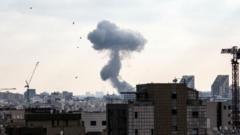Following U.S. military actions against Iran's nuclear infrastructure, regional tensions are palpable as responses from Iran and its allies suggest a volatile future. The potential for retaliation and the implications for international relations are now in sharp focus.
Escalation in Iran: U.S. Air Strikes and Regional Implications

Escalation in Iran: U.S. Air Strikes and Regional Implications
The United States has launched significant air strikes in Iran, targeting nuclear facilities and raising concerns about an escalation of conflict in the Middle East.
In a dramatic turn of events early yesterday, the United States officially entered active conflict with Iran by conducting air strikes on key nuclear sites, including the fortified Fordo facility. Pentagon reports indicate that these operations inflicted "severe damage" on Iran's capabilities, heightening fears of escalating violence throughout the region.
In the hours following the strikes, President Trump's remarks on the topic of regime change intensified anxieties, particularly as Israel began its own military operations against Iranian urban centers, claiming to have intercepted missiles fired from Iran. The crucial question remains: does Iran still hold the capability to produce a nuclear weapon? This uncertainty is compounded by statements from the Director of the U.N.'s nuclear oversight body, who suggested that Iran had relocated its stockpile of near-bomb-grade uranium prior to the U.S. actions.
Iranian officials responded vehemently, with Foreign Minister Abbas Araghchi asserting the nation is prepared to employ all necessary measures to safeguard its interests and citizenry. Recent intelligence reports show that Iran-aligned militias may be gearing up to target American bases in Iraq and potentially Syria, adding another layer of complexity to the situation.
As the conflict deepens, analysts warn that these developments are likely to signal a more perilous chapter in the ongoing warfare. The strike is poised to diminish prospects for diplomatic resolutions between Iran and Israel, while leaving Iran potentially emboldened in its pursuit of nuclear technology.
Reactions to the strike reverberated worldwide, with allies and adversaries alike condemning the U.S. actions and urging for restraint. Nations in the Gulf voiced concerns about possible backlash, while in Israel, the bombings were largely hailed as a success for Prime Minister Netanyahu.
Amidst the chaos, ordinary Iranians expressed shock and disbelief, with one man remarking on the rapid escalation that brought the region to such a critical point within days. As sentiment in Iran shifts toward preserving its sovereignty, the question looms: what moves will Iran take next, and how will the U.S. and its allies respond in this increasingly fraught geopolitical landscape?





















